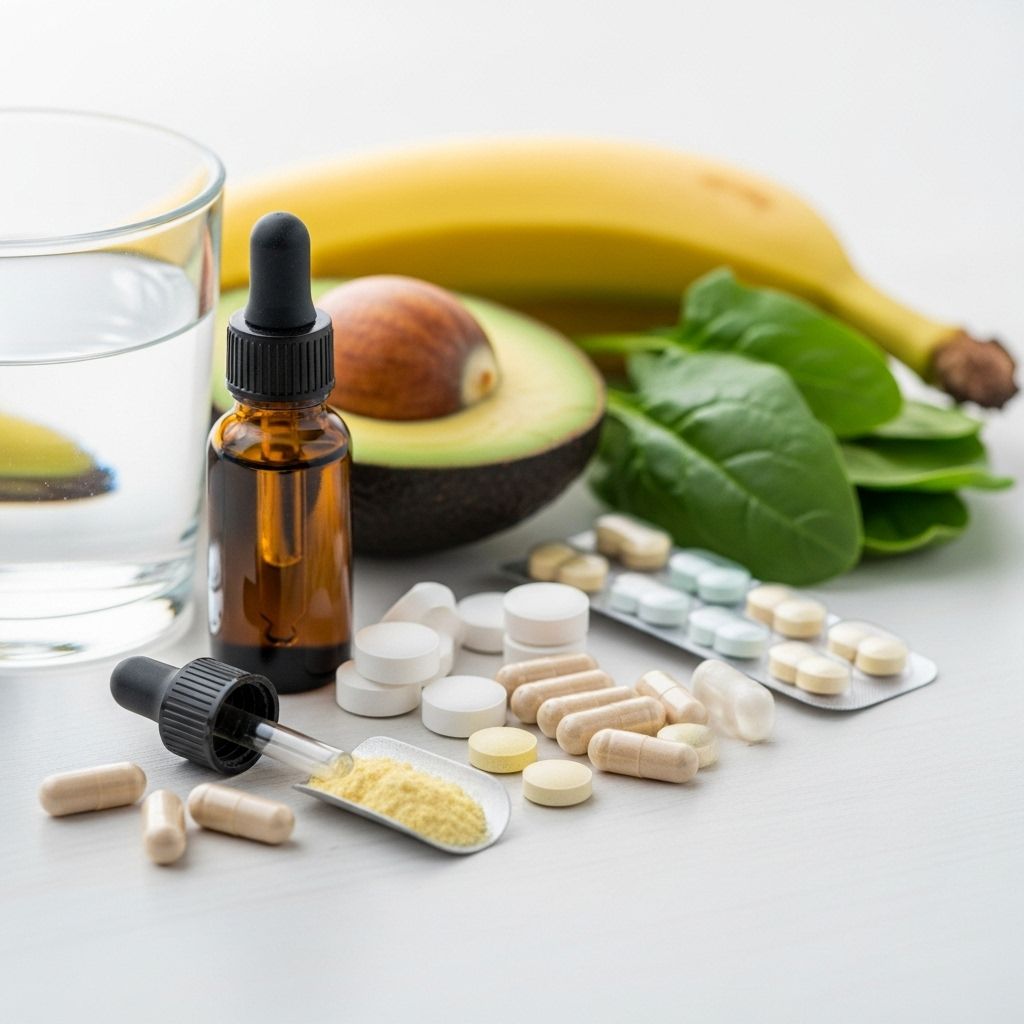Best Potassium Supplements: Guide to Choosing & Using Safely
Discover the top potassium supplements and learn how to choose the right one for your health needs safely and effectively.

Potassium is a vital mineral that plays numerous essential roles in maintaining optimal health, from regulating heartbeat and supporting muscle function to balancing fluid levels throughout the body. While obtaining potassium through a nutrient-rich diet is ideal, many people struggle to meet their daily requirements through food alone. This comprehensive guide explores everything you need to know about potassium supplements, including the different types available, how to choose the right one, proper dosage guidelines, and important safety considerations to keep in mind.
Understanding Potassium and Why It Matters
Potassium stands as one of the most important minerals your body needs to function properly. As an electrolyte, it carries an electrical charge that enables it to perform critical tasks throughout your body. This essential mineral doesn’t just support one system—it works across multiple bodily functions simultaneously, making it indispensable for overall health and wellness.
Your body relies on potassium to maintain proper fluid balance within cells, ensure muscles contract effectively (including your heart muscle), support nervous system communication, regulate blood pressure, and preserve bone and kidney health. Despite its importance, studies indicate that most American adults fail to consume adequate amounts of potassium daily, creating a widespread nutritional gap that can impact health in various ways.
The body cannot produce potassium on its own, meaning you must obtain it through external sources—primarily through diet, and when necessary, through supplementation. Understanding when and how to use potassium supplements safely can help you maintain optimal levels of this crucial mineral without risking potential complications.
Daily Potassium Requirements and Deficiency Signs
The National Institutes of Health has established minimum daily potassium recommendations for different groups. Adult men aged 19 and older should aim for approximately 3,400 milligrams daily, while adult women in the same age range need about 2,600 milligrams. These requirements increase during pregnancy to 2,900 milligrams and adjust slightly during breastfeeding to 2,800 milligrams.
When potassium levels drop too low—a condition known as hypokalemia—various symptoms can emerge that signal your body needs more of this essential mineral. Common signs of potassium deficiency include persistent fatigue and weakness, muscle cramping and spasms, constipation, and irregular heart rhythms. These symptoms can develop due to inadequate dietary intake, excessive fluid loss through vomiting or diarrhea, heavy sweating, or the use of certain medications like diuretics and laxatives.
Certain health conditions can also interfere with potassium absorption or retention. People with inflammatory bowel disease, chronic kidney disease, or those taking specific medications may find it particularly challenging to maintain adequate potassium levels through diet alone, potentially making supplementation necessary under medical supervision.
Types of Potassium Supplements Available
Potassium supplements come in several different forms, each with unique characteristics, absorption rates, and intended uses. Understanding these distinctions helps you make an informed choice about which type might work best for your specific needs.
Potassium Chloride represents the most common form found in supplements and is often prescribed for treating deficiency. This form closely resembles the potassium found naturally in foods and is readily absorbed by the body. Many multivitamins include potassium chloride, and it’s available as a standalone supplement in various formulations including tablets, capsules, and liquid forms.
Potassium Citrate is frequently used to prevent kidney stones and may be recommended for people with certain urinary conditions. This form helps alkalize urine, making it particularly beneficial for those prone to developing certain types of kidney stones. It’s generally well-tolerated and can be easier on the digestive system than some other forms.
Potassium Gluconate is another popular supplement form that tends to be gentler on the stomach. While it contains less elemental potassium per dose compared to potassium chloride, it can be a good option for people who experience gastrointestinal discomfort with other forms.
Potassium Bicarbonate may be prescribed to address metabolic acidosis or as part of treatment for certain medical conditions. This form helps neutralize acid in the body and can support overall pH balance.
How to Choose the Best Potassium Supplement
Selecting the right potassium supplement requires careful consideration of multiple factors. The best choice depends on your individual health status, why you need supplementation, any existing medical conditions, and medications you’re currently taking.
Consider Your Specific Needs: If you’re looking to address a diagnosed deficiency, your healthcare provider will likely recommend a specific form and dosage. For general supplementation to support overall health, a multivitamin containing potassium or a low-dose standalone supplement may suffice.
Check the Dosage: Over-the-counter potassium supplements are typically limited to 99 milligrams per dose due to FDA safety regulations concerning higher-dose oral potassium products. This amount represents roughly 2% of the daily recommended value. While this might seem low, it’s an important safety measure, as excessive potassium intake can lead to serious health complications, particularly in people with kidney problems or those taking certain medications.
Evaluate Absorption and Tolerability: Different forms of potassium absorb differently and may cause varying levels of gastrointestinal effects. Extended-release formulations can minimize stomach upset and are often better tolerated than immediate-release versions. If you’ve experienced digestive issues with one form, discussing alternative options with your healthcare provider may lead to better results.
Quality and Purity Standards: Look for supplements that have been tested by third-party organizations such as USP (United States Pharmacopeia), NSF International, or ConsumerLab. These certifications indicate that the product contains what the label claims and is free from harmful contaminants. Quality manufacturing practices ensure you’re getting a reliable, safe product.
Form and Convenience: Potassium supplements are available in tablets, capsules, powders, and liquids. Consider which form fits best into your routine and is easiest for you to take consistently. Some people prefer liquid forms for easier swallowing, while others find tablets or capsules more convenient.
Proper Dosage Guidelines and Usage Instructions
Taking potassium supplements correctly is crucial for both safety and effectiveness. Always follow your healthcare provider’s specific recommendations, as individual needs vary based on numerous factors including age, health status, medications, and dietary intake.
For most people using over-the-counter supplements, the typical dose ranges from 99 milligrams daily, though some situations may warrant higher amounts prescribed by a physician. Never exceed recommended dosages without medical supervision, as too much potassium can be dangerous.
Take potassium supplements with food and a full glass of water to minimize stomach irritation. This also helps with absorption and reduces the risk of gastrointestinal discomfort. If you’re taking tablets or capsules, swallow them whole rather than crushing or chewing them, as this can cause mouth and throat irritation.
Timing matters when it comes to potassium supplementation. Spreading doses throughout the day, if taking multiple doses, helps maintain more consistent potassium levels. Some people find taking supplements with meals helps them remember and reduces digestive side effects.
Safety Considerations and Potential Risks
While potassium supplementation can be beneficial for those with deficiency or increased needs, it’s not without risks. Understanding these potential dangers helps ensure safe, appropriate use.
Hyperkalemia Risk: Consuming too much potassium can lead to hyperkalemia, a condition characterized by dangerously high potassium levels in the blood. This is particularly concerning for people with kidney disease, as damaged kidneys cannot effectively remove excess potassium from the body. Symptoms of hyperkalemia include abnormal heart rhythms, nausea, fatigue, and in severe cases, can be life-threatening.
Medication Interactions: Certain medications interact with potassium supplements, potentially causing dangerous elevations in blood potassium levels. ACE inhibitors and angiotensin receptor blockers (ARBs) used for blood pressure management, potassium-sparing diuretics, and some other medications can increase potassium retention. Always inform your healthcare provider about all medications and supplements you’re taking.
Digestive Side Effects: Some people experience gastrointestinal discomfort when taking potassium supplements, including nausea, vomiting, diarrhea, or abdominal discomfort. These effects are often dose-dependent and may improve by taking supplements with food or switching to a different form.
Who Should Avoid Potassium Supplements: People with chronic kidney disease, those taking potassium-sparing medications, individuals with Addison’s disease, and anyone with severe tissue damage should generally avoid potassium supplements unless specifically directed by their healthcare provider. These conditions can impair the body’s ability to regulate potassium levels effectively.
Natural Food Sources vs. Supplements
While supplements can help address deficiency, obtaining potassium through whole foods remains the preferred approach whenever possible. Food sources provide potassium alongside other beneficial nutrients, fiber, and compounds that work synergistically to support health.
Potassium-rich foods include beans (particularly white, soy, and lima beans), dried fruits like apricots and raisins, fresh fruits such as bananas, avocados, and citrus, leafy greens including spinach and Swiss chard, nonfat dairy products, seafood like wild salmon and halibut, and vegetables such as squash, carrots, and potatoes. These foods not only provide potassium but also deliver vitamins, minerals, antioxidants, and other health-promoting compounds.
The advantage of dietary potassium is that it’s generally safer than supplementation—it’s difficult to consume dangerous amounts through food alone, especially for people with normal kidney function. The body handles potassium from food differently than concentrated supplement forms, processing it more gradually and efficiently.
However, some individuals cannot obtain sufficient potassium through diet due to food restrictions, absorption problems, increased losses, or significantly elevated needs. In these cases, supplements become a necessary tool for maintaining adequate levels.
When to Consult a Healthcare Provider
Before starting any potassium supplement, consulting with a healthcare provider is essential. They can assess whether you actually need supplementation through blood tests, review your medical history and current medications for potential interactions, recommend the appropriate form and dosage, and establish a monitoring plan to ensure safety and effectiveness.
You should definitely seek medical advice if you’re experiencing symptoms of potassium deficiency, have been diagnosed with a condition affecting potassium levels, take medications that can influence potassium, have kidney disease or impaired kidney function, or are pregnant or breastfeeding. Regular monitoring through blood tests helps ensure potassium levels remain in the optimal range without climbing too high or dropping too low.
Tips for Maintaining Healthy Potassium Levels
Supporting healthy potassium levels involves more than just supplementation. A comprehensive approach includes eating a varied, whole-foods diet rich in potassium-containing foods, staying properly hydrated, managing conditions that affect potassium balance, avoiding excessive sodium intake (as high sodium can increase potassium losses), limiting alcohol consumption, and having regular check-ups with blood work to monitor mineral levels.
Be mindful of factors that can deplete potassium, such as excessive sweating during intense exercise or hot weather, certain dietary patterns that exclude potassium-rich foods, prolonged use of laxatives or diuretics, and chronic stress that may affect mineral balance. Addressing these factors helps maintain stable potassium levels naturally.
Frequently Asked Questions
Q: Can I take potassium supplements without a doctor’s recommendation?
A: While over-the-counter potassium supplements with 99 mg or less are generally available without prescription, it’s strongly recommended to consult a healthcare provider before starting any potassium supplementation. They can determine if you actually need supplements and ensure they’re safe given your health status and medications.
Q: Why are over-the-counter potassium supplements limited to 99 mg?
A: The FDA restricts over-the-counter potassium supplements to 99 mg per dose due to safety concerns. Higher doses of potassium chloride can cause serious gastrointestinal damage and lead to dangerous elevations in blood potassium levels, particularly in people with kidney problems or those taking certain medications.
Q: How long does it take for potassium supplements to work?
A: The timeframe varies depending on the severity of deficiency and individual factors. Some people may notice improvement in symptoms like muscle cramps within a few days, while correcting significant deficiency may take several weeks of consistent supplementation combined with dietary improvements.
Q: Can potassium supplements help lower blood pressure?
A: Adequate potassium intake can support healthy blood pressure, particularly in people who consume high amounts of sodium. However, supplements alone shouldn’t replace prescribed blood pressure medications. Always consult your healthcare provider about managing blood pressure through diet, supplements, and medication.
Q: What are the signs I might be taking too much potassium?
A: Symptoms of excess potassium (hyperkalemia) include irregular heartbeat, nausea, fatigue, weakness, and tingling sensations. If you experience these symptoms while taking potassium supplements, stop taking them and seek immediate medical attention, as severe hyperkalemia can be life-threatening.
Q: Should I take potassium supplements if I eat a healthy diet?
A: Most people eating a varied, whole-foods diet rich in fruits, vegetables, legumes, and other potassium-containing foods don’t need supplements. Supplementation is typically reserved for those with diagnosed deficiency, increased needs, or conditions that interfere with potassium absorption or retention.
Q: Can I take potassium supplements with other vitamins and minerals?
A: Generally, potassium can be taken with other supplements, but timing and combinations matter. Some nutrients and medications interact with potassium absorption or elimination. Discuss your complete supplement regimen with your healthcare provider to avoid potential interactions.
Final Thoughts
Potassium supplements can serve as a valuable tool for people who cannot obtain adequate amounts through diet alone or have increased needs due to medical conditions. However, supplementation requires careful consideration, appropriate dosing, and medical supervision to ensure both safety and effectiveness. The limited potassium content in over-the-counter supplements reflects important safety considerations, particularly regarding the risks of excessive intake.
Prioritizing potassium-rich whole foods remains the best approach for most people, as these provide not only potassium but also numerous other health-promoting nutrients. When supplementation becomes necessary, working closely with a healthcare provider ensures you choose the right form, take the appropriate dose, and monitor for potential complications or interactions with medications.
Remember that maintaining optimal potassium levels is just one component of overall health. A balanced approach that includes nutritious eating, regular physical activity, adequate hydration, stress management, and appropriate medical care creates the foundation for long-term wellness. Whether through food or supplements, ensuring adequate potassium intake supports your heart, muscles, nerves, and overall vitality.
Read full bio of medha deb












